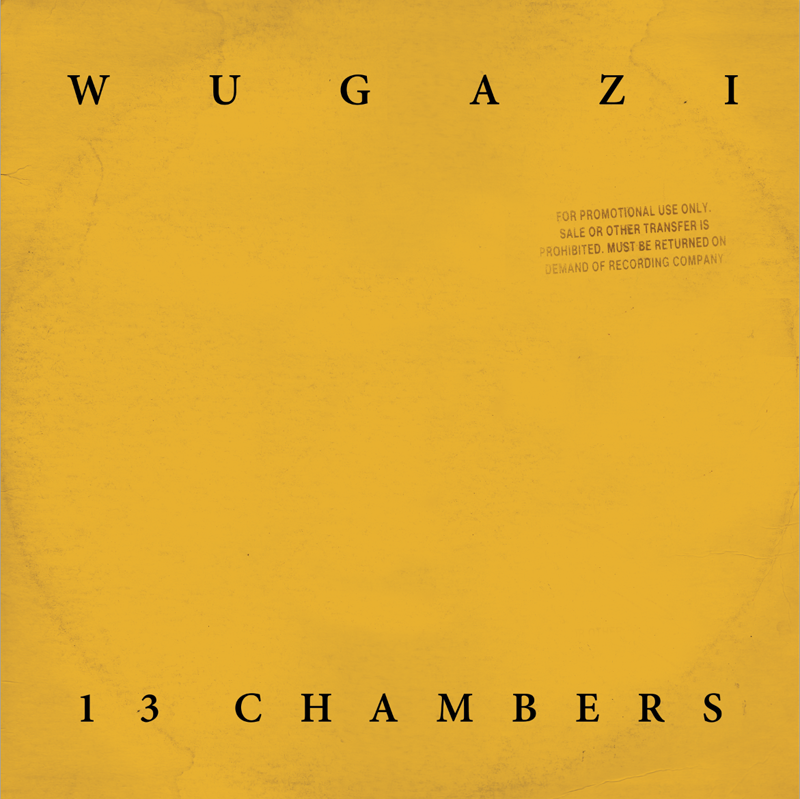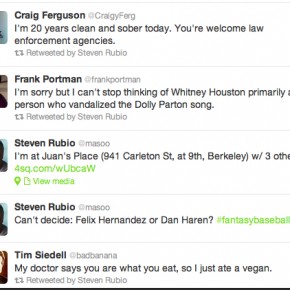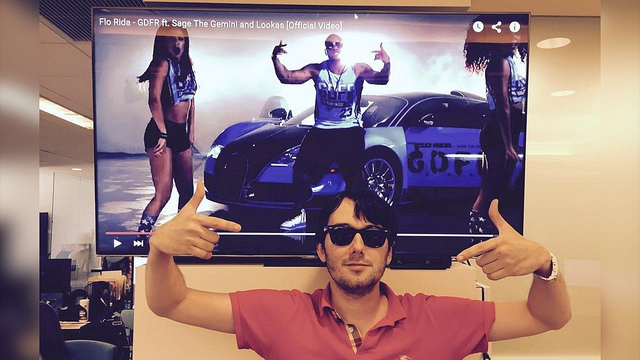When word started spreading about Wugazi, the excitement in social media circles was palpable. To those long familiar with mash-ups, myself included, this came as a surprise. It has been eight years, after all, since Danger Mouse released the form’s first widely discussed masterwork The Gray Album, an astonishingly vital fusion of The Beatles’ double-LP colloquially referred to as the “white album”, and Jay-Z’s The Black Album. But whether Cecil Otter and Swiss Andy’s artful palimpsest of the Wu-Tang Clan and Fugazi was tapping into nostalgia for early 2000s mash-up culture, or reaching people who somehow had missed out on its largely illicit pleasures, the initial response to their project indicated that they had become suppliers to a powerful pent-up demand.
We live at a time when novelty is both exalted and short-lived. Indeed, one could argue that we’ve been doing so for over two hundred years, the span defined as “modernity” and, if you believe in reports of its demise, whatever has followed in its wake. What has changed is the pace of obsolescence. New ideas may have traveled fast back in the mid-nineteenth-century — the invention of railroads and the telegraph saw to that — but they travel ever so much faster today. Back then, an idea might have been considered old news if it was a few years old; these days something we learned about last week frequently fits the bill.
But it matters who gets grouped into that first-person plural. There are millions, even billions of people right now who still get most of their news long after the mainstream media has moved on to something else. Despite the rise of the Internet, information still spreads asymmetrically, completely saturating some well-connected pockets before it comes anywhere near others. There’s a coercive dimension to statements that presume who “we” are without a background check.
That’s why, when I started thinking about the Wugazi project, I decided to reach out to friends and acquaintances. While the idea of fusing the music of the Wu-Tang Clan and Fugazi might not have seemed particularly original, or its execution particularly compelling, that didn’t mean that others would share my perception. Judgments of taste are necessarily subjective. Whether I keep a record in heavy rotation or “remainder” it to the archive of ones I listened to solely for the purposes of writing a review still depends more on my personal history than anything else. But there’s a lot to be said for restraining one’s reflexes, that impulse to give a quick thumbs-up or thumbs-down, in order to consider a range of opinions.
Getting a second, third and fourth opinion seemed particularly important in this instance, since mash-ups are almost always classified as contraband. You can’t just go down to the store and purchase them on CD or vinyl. They aren’t available to download through iTunes or Amazon. Nor will you hear them on the radio. In other words, the distribution of mash-ups is very hit-or-miss.
Throw in the added complication of the cease-and-desist orders that force their creators to stop getting the word out and you have the formula for a great deal of confusion. Even when two people have been paying attention to the mash-up genre for a long time, it’s a good bet that their collections will differ markedly. Even as well-publicized a project as Danger Mouse’s The Gray Album, which I’ve been listening to regularly for the past eight years, isn’t guaranteed to constitute common ground for mash-up fans.
Indeed, the first surprise I got in reaching out for people’s thoughts on Wugazi was how few of them had heard of it. Because I kept seeing links to the project pop up on my Facebook feed — and because I tend to think of myself as being somewhat out of the loop — I had incorrectly assumed that the word had spread much farther than it actually had. But I had forgotten that quite a few of my Facebook friends are individuals I got to know by attending the annual Pop Conference, many of whom have ties to the music industry.
I should have known better. When people take it for granted that everyone is familiar with cultural references I don’t know, it troubles me deeply. And yet I’d been asking people for their assessment of the Wugazi project without asking them whether they had even heard of it. While a number of them expressed gratitude for my inadvertent tip, I still felt bad for having reinforced the divide between those who trade insider knowledge about the culture industry and the outsiders who get their information second or third-hand. That’s why I vowed to not put words in the mouth of anyone who responded to my query.
One thing I underestimated was just how big a deal Wu-Tang Clan is for many of today’s twenty-somethings, who were grade-schoolers when the group came on the scene. Noah Pollock, who raps as Knomad in the alternative hip-hop duo Class Project, welcomed the opportunity to listen to Staten Island’s finest with fresh ears:
Fugazi means very little to me, whereas 36 Chambers is my favorite album of all time. Nonetheless, this made me listen to music I had long banished as overplayed as though it were new again. It’s like web 3.0. Not just what you want but how you want it.
Rory Pitman, who, like Noah, did a research paper on hip-hop while a student of mine, was similarly effusive, reposting the link I’d sent him with a catchy blurb:
Sicker than ebola. A masterpiece of the Mashup. The ODB sample at the beginning almost brings tears to my eyes.
Onetime New Yorker Sally Northmore also had more to say about Wu-Tang Clan than Fugazi:
I’ve never listened to much Fugazi, and Wu-Tang were local celebrities where I grew up in “Shaolin”. So, that’s my listener case. It’s well done to my ears, funny listening.
Interestingly, the people I heard from who were my age or older also tended to focus their attention on the Wu-Tang Clan. Steven Rubio politely declined to pass judgment:
I like how it sounds, but I’ve never paid much attention to Fugazi, so I’m useless as far as putting this into some kind of useful context.
George Kresak, trained as a literary scholar like Steven and myself, had an easier time thinking of something to say:
Here is my initial, very visceral response: Fugazi is a much better musical accompaniment to Wu-Tang’s rappers than their own DJs.
Some wondered whether it was wise to combine the hip-hop legends’ outré wordplay with the music of an indie rock band with a reputation for political correctness. Annie Holub, a longtime music critic for the Tucson Weekly, soon found herself second-guessing the concept:
At first I thought it was awesome, but then I realized I was more interested in the way they sampled Fugazi than the actual individual whole songs. And then I started trying to listen to the lyrics, which are for the most part unspectacular and typically misogynist.
The more she listened, the less sense the project seemed to make:
It seems the potential for powerful thematic appropriations of the original Fugazi songs wasn’t utilized. Then again, I can’t understand most of the lyrics, because my middle-class white girl ears just can’t process certain things, I think, so I may be missing thematic crossovers that are actually there.
Unlike most of the people I heard from, Annie has an investment in Fugazi’s music. So do I, for what it’s worth. Even if I was never a huge fan and would sometime’s express annoyance at the self-righteousness of the band or its followers, I still consider Fugazi to be a significant cultural touchstone.
Although I realize that Wu-Tang Clan and its numerous spin-offs have sold more records than Fugazi — a great deal more, in fact — I still considered them equals when I first sat down to listen to the Wugazi tracks. But the responses I received were a major reality check. The simple truth is that the majority of Wu-Tang Clan fans have never even heard of Fugazi, whereas Fugazi fans are almost certain to know the Wu-Tang Clan. In fact, one could plausibly argue that the “Wugazi” moniker is a sign of disrespect, subordinating the platinum-selling hip-hop collective into its far less successful indie rock counterpart.
Noah seemed to think that Wugazi was targeted primarily at a different audience than the Wu-Tang Clan’s original material, a reasonable assumption given Cecil Otter and Swiss Andy’s self-presentation:
I think it makes accessible music that previously was not. While this will still keep MY mother at bay, others’ mothers may have only avoided the bass; now they can enjoy the lyrical content without the offending noise.
Rory was less cynical, but still thought of the project as a means of reaching new audiences:
I feel that mash-ups in general, make old, good music available to new listeners who may not have been familiar with the original material. Mash-ups expose new generations to bands and in a way, make them more relevant. . . It can also generate revenue for bands that might need it, young listeners may now go buy an old Fugazi or Wu-tang album on iTunes, which is so conveniently linked on the Wugazi website.
As longtime fans of the Wu-Tang Clan, however, their own reaction to the project had a different aspect. They were happy that others might get to appreciate the group for the first time, but even happier that the mash-up had given them a reason to renew their commitment.
For someone like George, by contrast, the lack of a deep investment in either the Wu-Tang Clan or Fugazi facilitated a dispassionate assessment of the mash-up genre’s aesthetic possibilities:
What sets this project apart is the focus on two recording projects in dialogue together. . . I’m sure there are other projects of this sort that I am unaware of, but the only other one that I know of is the Rhymefest/Mark Ronson mash-up project that plays with Michael Jackson’s music, titled Man in the Mirror. If you haven’t heard this, you must. It pays tribute to Michael Jackson, while at the same time it uses his music to shape its own soundscape and to demarcate its own concerns lyrically. It’s not a mash-up, but like the best of the mash-up genre, it is both playful and serious, sometimes having fun with the weirdness of MJ, but also respecting both his musical talents and his social concerns, at times, perhaps, even more than deserved (at least with respect to the latter). There are, of course, also the ironic juxtapositions of cool vs. dork, hard vs. soft, but then again, they come at Rhymefest’s expense as often as MJ’s. The result? Here we have a bad-ass rapper from the ghetto in dialogue with a “sissy” R&B singer who typically gets no respect whatsoever from said rapper’s community. I’m not sure what it means ultimately, but if nothing else it’s a start toward providing a space for more inclusiveness, more tolerance and more jouissance in the hip-hop community. But apart from whatever it achieves in these terms the record, like the Wugazi project, stands apart from the typical mash-up mix in its deep engagement with the music of one artist. I’m not saying one approach is better than the other, but I have to say that I would welcome more projects like these, if only because they help us to appreciate the work of the artist engaged with even more fully by re-contextualizing it.
The basic argument here, that mash-ups are richer when there’s a deeply embedded tension between their components, was echoed in a lot of the feedback I received. While there wasn’t total agreement on whether Wugazi had managed to pull this off successfully, everyone seemed to think that the project was intended to do so.
Like Annie, Rory noted the sharp contrasts between the Wu-Tang Clan and Fugazi:
The contrast between philosophies on sex and drugs between the straight-edge Fugazi and fucking bitches/smoking blunts Wu-Tang Clan should be noted. It’s somewhat ironic that such diametrically opposed artists can make an album together, but is perhaps made possible by the fact that they don’t actually get in a studio together and cut an album. Mash-ups allow for such distances as time, genre, and politics, to be bridged in ways not possible before.
In a way, the sheer audacity of bringing such radically antithetical artists together is the point. The resulting hybrid functions as an implicit critique of the divisions in our society.
And maybe that provides sufficient justification for projects like Wugazi. For all the progress that has been made in the promotion of tolerance and diversity, the fact that we can still thrill so easily at the transgressive quality of mash-ups tells us that our goal is still a long way off. But that doesn’t mean that we should dismiss the pleasures of this music. It’s better to be excited by the prospect of mixing than to be alarmed by it.





